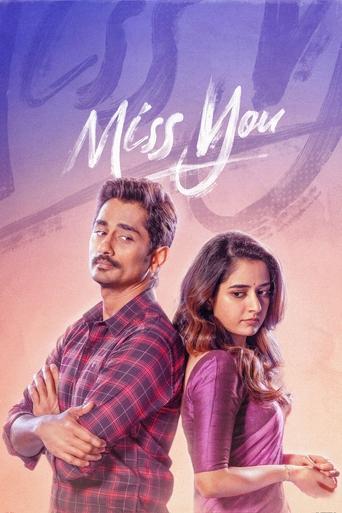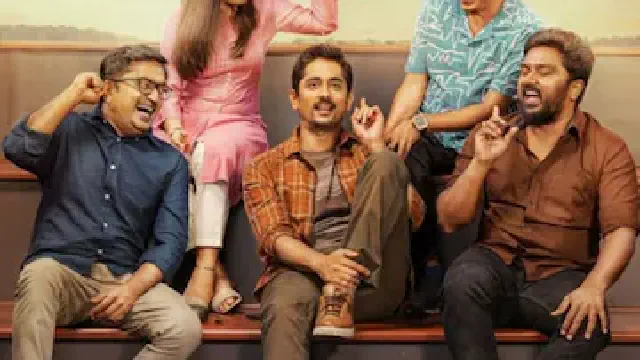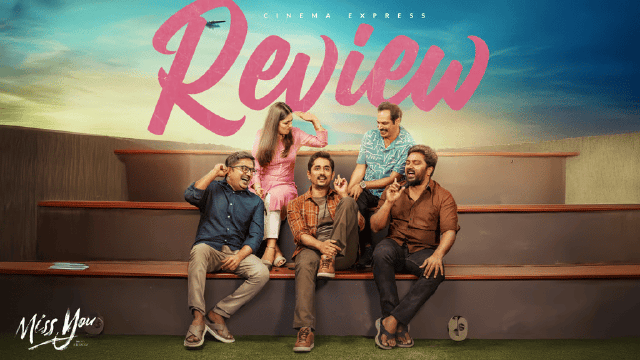
All Recent Reviews of
Miss You
Reviewers on this page:
Kirubhakar Purushothaman
Srivathsan Nadadhur
Avinash Ramachandran
Vishal Menon
Sudhir Srinivasan
About Miss You

| Title: | Miss You |
|---|---|
| Original Title: | மிஸ் யூ |
| Plot: | What happens when a guy falls in love with the girl he thought he hated the most? Why does her simple `no` mean so much more than it seems?. |
| Cast: | Siddharth, Ashika Ranganath, Karunakaran, Balasaravanan, Sastika Rajendran, Lollu Sabha Maaran |
| Director: | N. Rajasekhar |
| Cinematography: | K. G. Venkatesh |
Miss You
Kirubhakar Purushothaman
News 18

Siddharth’s Old-School Rom-Com Is Nearly Decent
Miss You seems real despite its commercial cinematic absurdities like bar songs and street fights
It’s been a minute since a rom-com like Miss You was made in Tamil. It is not to say the film is rare or great, but it is just one of those old-school rom-coms that harps just on a straightforward story and drama. A kind that hasn’t been around for a while now. Directed by N Rajasekar, starring Siddharth and Ashika Ranganath in the lead roles, Miss You reminds you of the times when not every single release had to be unique or bearing a USP or having the need to cater to the whole nation. It has low stakes, featuring normal people, cliched songs, and fights that evoke a sense of nostalgia. The strong point of Miss You is that is aware of its limitations and contrivances. At one instance, when a character is forced to narrate the past, he lets out a disclaimer that the ‘flashback’ is going to feature a story within the story. That doesn’t absolve the film of its mistakes, but it is nice to know now and then that the filmmakers aren’t in a bubble.
Miss You
Srivathsan Nadadhur
(for All in a Frame)
Independent Film Critic

In times when films have become social/ideological statements, it’s refreshing how Miss You still wants to be a simple story about ordinary people, everyday situations. The plot, centred on memory loss, fragility of modern-day marriages and second chances, banks on its slice-of-life treatment to see itself through. Yet, its simplicity paves the way for mediocrity due to the jaded treatment, time-tested storytelling tropes and poor music. There are flashes of Siddharth’s good-ol charm and decent performances by Ashika Ranganath and Karunakaran for intermittent relief. Miss You has its moments but is too casual and lacks conviction to be a memorable romance drama.
Miss You
Avinash Ramachandran
The New Indian Express

Ashika Ranganath, Siddharth anchor this predictable but palatable self-aware masala romcom
The Siddharth-Ashika Ranganath film definitely delivers by keeping the smiles coming even if the emotional connection goes missing for stretches of time.
There are two important meet-cutes in director N Rajasekhar’s third film, Miss You. One is when aspiring filmmaker Vasu (an effective Siddharth) looks at Subbulakshmi (a terrific Ashika Ranganath) during a protest for the right to wear a hijab. One is when aspiring filmmaker Vasu looks at Subbulakshmi acting all cutesy during a wedding event of a common friend. Both are template scenes that we have gotten used to seeing in innumerable Tamil films. It is a commentary on how our heroes fall in love with heroines only if they are either bold and confident or bubbly and cute. What about the women who are neither bold nor confident, neither bubbly nor cute? That’s exactly what Miss You wanted to talk about, but it has one big problem. Contrary to the film’s protagonist who wanted to tell a love story from the perspective of a woman, Miss You is firmly from the POV of the man.
Miss You
Vishal Menon
The Hollywood Reporter India

Siddharth Stars In An Instantly Forgettable Drama About A Man Who Cannot Remember
The awkward songs, forced fight scenes and general predictability makes 'Miss You' the kind of film we begin to forget as we’re watching it
There’s a tiny, two-minute stretch towards the end of the cloyingly sentimental Miss You, when we finally get a semblance of an idea that’s actually worth one’s time. Until then, Miss You is about Vasu (Siddharth), a man who cannot remember two years of his life, including his unhappy marriage. But as the film resolves Vasu’s battle with amnesia (albeit conveniently), he gets a call from a movie producer who approves of a script he had narrated a year ago. He’s been through so much during this period that he no longer remembers what he pitched and begins to frantically look for the forgotten idea. Getting a project greenlit, as we all know, is so close to impossible that we quickly sympathise with Vasu. Imagine looking through all your notes to piece together a script you’ve forgotten. Imagine having to trace your steps to go through the emotional and creative journey that made you a writer in the first place. Like learning to play the violin again, or trying to remember the recipe to your signature dish, there’s so much one can do with the concept of a man with amnesia. But Miss You is entirely satisfied chasing the one aspect of it that every single film before this has already addressed…love.
Miss You
Sudhir Srinivasan
The New Indian Express

Much potential without payoff
In this film about memory loss, the real loss is the inability of the film to treat its premise with the love it deserves
You know, it sometimes feels like films don’t quite appreciate the promise of their premise as much as we do. Miss You, for instance, teases a fascinating idea: a man forgets a significant period of his life after an accident—how does this affect his love life? It’s not exactly a groundbreaking premise; memory loss is a well-worn trope. But within this framework lie rich possibilities: repercussions on relationship dynamics, explorations of vulnerability, and the bittersweet beauty of rediscovery. We see this potential, but the frustration is in the film’s failure to do so.